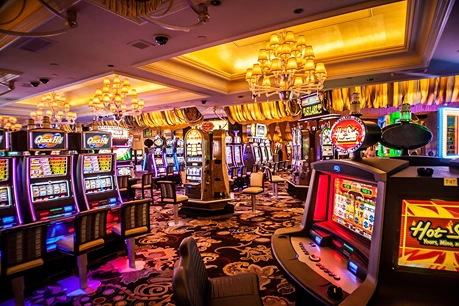The gambling industry has undergone a dramatic transformation over the past few decades, splitting into two distinct realms: online casinos and their traditional, brick-and-mortar counterparts. Each offers a unique experience, appealing to different types of players with varying preferences, lifestyles, and expectations. Whether it’s the glitz and glamour of a physical casino floor or the convenience and innovation of a digital platform, the battle between these two worlds continues to captivate enthusiasts globally. This website dives deep into the showdown, exploring what sets them apart, their strengths and weaknesses, and how they cater to the modern gambler.
“As the cards are dealt and the wheels spin, the choice between virtual and physical gambling becomes a reflection of who we are—seekers of convenience or lovers of spectacle,”
says gambling historian John R. Milton. For some, the allure of a real casino lies in its sensory overload—the clinking of coins, the shuffle of cards, and the palpable excitement in the air. For others, online casinos represent the future, offering unparalleled accessibility, a vast array of games, and cutting-edge technology that brings the casino experience right to your fingertips. But which one truly reigns supreme? The answer isn’t straightforward, as it depends on individual priorities like convenience, social interaction, game variety, and even financial considerations. Through detailed comparisons and insights, we aim to shed light on this ongoing rivalry and help you decide which side of the divide suits you best.

As the gambling landscape evolves, both online and offline casinos are adapting to meet the demands of a diverse audience. From luxurious Las Vegas establishments to sleek mobile apps, the competition is fierce, and the stakes are high. This homepage serves as your gateway to understanding the core differences, benefits, and drawbacks of each option, setting the stage for a deeper exploration across our site. Let’s begin by unpacking the broader context of this epic clash before diving into the specifics that define these two gambling giants.
The Evolution of Gambling: From Physical Floors to Digital Screens
Gambling has been a part of human culture for centuries, evolving from rudimentary dice games in ancient civilizations to the sophisticated systems we see today. Traditional casinos, with their opulent designs and vibrant atmospheres, have long been the gold standard for thrill-seekers. Places like Monte Carlo and Atlantic City became synonymous with luxury and risk, drawing crowds eager to test their luck amid the flashing lights and live entertainment. However, the rise of the internet in the late 20th century sparked a revolution, giving birth to online casinos and forever altering the gambling landscape.
The transition to digital platforms didn’t just replicate the physical experience—it redefined it. Online casinos introduced a level of convenience that physical venues could never match, allowing players to gamble from anywhere at any time. This shift also democratized access, making casino games available to people who might never step foot in a real casino due to location, cost, or personal preference. To highlight how these two formats compare today, here’s a table summarizing their key differences:
| Aspect | Online Casinos | Real Casinos |
|---|---|---|
| Accessibility | Play anytime, anywhere with internet access | Requires travel and adherence to hours |
| Game Variety | Thousands of games, constantly updated | Limited by physical space, fewer options |
| Social Interaction | Limited to chat or live dealer features | High-energy, face-to-face engagement |
| Cost | Lower costs, generous bonuses | Higher costs (travel, tips), exclusive perks |
| Atmosphere | Digital, reliant on tech (e.g., VR potential) | Tangible, sensory-rich experience |
| Payout Speed | Instant or within days (depending on method) | Immediate cashouts at the cage |
| Safety | Depends on site regulation and encryption | Regulated by local laws, physical security |
Yet, despite these advancements, traditional casinos have held their ground, banking on the irreplaceable charm of face-to-face interaction and the tangible thrill of a live game. Online platforms excel in variety and accessibility, while physical venues offer an unmatched atmosphere—each appealing to different facets of the gambling experience.
Today, the battle between online and offline casinos is more intense than ever. Physical casinos are enhancing their offerings with exclusive events, fine dining, and immersive experiences, while online platforms push the envelope with virtual reality, live dealers, and cryptocurrency payments. Both sides are vying for dominance, but they cater to different needs and desires. To truly understand this rivalry, we need to break it down to its core elements, starting with a detailed look at what sets these two worlds apart.
The Key Differences Between Online and Offline Casinos
When comparing online casinos to their real-world counterparts, several factors come into play, each influencing a player’s choice in distinct ways. These differences span accessibility, game variety, social experience, cost, and more. Below, we’ll explore these aspects in detail to provide a comprehensive view of this ongoing battle.
Accessibility and Convenience
One of the most significant advantages of online casinos is their accessibility. With just an internet connection and a device—be it a smartphone, tablet, or computer—players can dive into a game anytime, anywhere. There’s no need to travel, dress up, or adhere to operating hours. This flexibility is a game-changer for those with busy schedules or who live far from physical casino locations. In contrast, real casinos require physical presence, often involving travel costs, time commitments, and adherence to dress codes or entry fees. While this can be part of the appeal for some, it’s a barrier for others.
For those who prefer the convenience and excitement of online gambling, platforms like 1win offer an all-in-one solution. Known for its vast selection of casino games, sports betting options, and user-friendly mobile experience, 1win captures much of what makes online casinos so appealing. With attractive bonuses, fast payouts, and an easy sign-up process, it’s a prime example of how digital platforms are redefining what modern gambling can look like—accessible, dynamic, and tailored to today’s players.

Game Variety and Innovation
Online casinos excel in offering an expansive range of games, often numbering in the thousands. From classic slots and poker to niche offerings like virtual sports betting or themed games, the digital space is limitless. Developers continuously roll out new titles, incorporating advanced graphics, animations, and interactive features. Physical casinos, while offering a solid selection, are constrained by space and resources. You’ll find staples like blackjack, roulette, and slot machines, but the variety pales in comparison to online platforms. However, real casinos often provide a higher quality of live gameplay, with real dealers and physical equipment adding authenticity.
Social Interaction
The social element is where traditional casinos shine. The buzz of a crowded table, the camaraderie among players, and the chance to celebrate wins together create an atmosphere that online platforms struggle to replicate. While online casinos have introduced live dealer games and chat features to bridge this gap, they can’t fully mimic the energy of a packed casino floor. For extroverts or those who see gambling as a social outing, real casinos hold a clear edge. On the flip side, introverts or solo players might prefer the privacy and focus of online gaming.
Cost and Rewards
Cost is another critical differentiator. Online casinos typically have lower overheads, allowing them to offer generous bonuses, free spins, and loyalty programs that stretch a player’s budget further. There’s no need to tip dealers or pay for travel, making it a more economical choice for many. Real casinos, however, come with additional expenses—transportation, food, drinks, and sometimes accommodation. That said, physical venues often provide exclusive perks like comped meals, hotel stays, or VIP experiences that online platforms can’t match, appealing to high rollers willing to spend big.
Atmosphere and Immersion
The atmosphere of a real casino is unmatched: the sound of slot machines, the sight of chips stacking up, and the scent of anticipation in the air. It’s a full sensory experience designed to immerse players in a world of excitement. Online casinos, while convenient, rely on visuals and sound effects to create ambiance, which can feel less visceral. However, advancements like VR gaming are closing this gap, offering digital players a more immersive experience that might one day rival the real thing.
Payouts and Transactions
When it comes to payouts, online casinos offer a range of options—credit cards, e-wallets, cryptocurrencies—but processing times can vary from instant to several days, depending on the platform and method. Real casinos provide the instant gratification of cashing out chips at the cage, a tangible reward that many players value. However, online platforms often have higher payout percentages due to lower operating costs, which can mean better long-term returns for players.
Safety and Regulation
Safety is a concern for both formats, but the risks differ. Online casinos require trust in digital security—encryption, licensing, and fair play algorithms are critical. Players must research a site’s reputation to avoid scams. Real casinos, regulated by local authorities, offer physical security and oversight, but they’re not immune to cheating or theft. Your choice might depend on whether you’re more comfortable with digital trust or physical accountability.

Lists: Pros and Cons of Each Option
To further clarify the distinctions, here are some pros and cons of online and real casinos:
Online Casinos – Advantages:
- Play from home or on the go, no travel required.
- Massive game libraries with frequent updates.
- Attractive bonuses, free spins, and loyalty rewards.
- Lower overall costs with no physical overhead.
- Privacy and control over your gaming environment.
Online Casinos – Disadvantages:
- Limited social interaction compared to live settings.
- Dependent on internet speed and device quality.
- Potential delays in withdrawals depending on the platform.
- Risk of unregulated or fraudulent sites if not vetted.
Real Casinos – Advantages:
- Immersive atmosphere with sights, sounds, and energy.
- Immediate payouts in cash or chips.
- Social experience with other players and staff.
- Exclusive perks like free drinks or hotel stays for big spenders.
- Physical security and regulated environment.
Real Casinos – Disadvantages:
- Higher costs due to travel, dining, and tipping.
- Limited game variety due to space constraints.
- Time and location restrictions based on operating hours.
- Dress codes or entry fees may apply.
The key differences between online and offline casinos boil down to a trade-off between convenience and experience. Online casinos prioritize flexibility, variety, and cost-efficiency, making them ideal for the modern, tech-savvy gambler. Real casinos, however, deliver an irreplaceable atmosphere and social thrill, appealing to those who crave the classic gambling vibe. Neither is inherently “better”—it’s about what aligns with your lifestyle, budget, and enjoyment. As technology advances, the lines may blur further, but for now, the battle of these two worlds rages on, each carving out its niche in the gambling universe.
Online Casinos vs. Real Casinos: The Battle of Two Worlds
The gambling industry has undergone a dramatic transformation over the past few decades, splitting into two distinct realms: online casinos and their traditional, brick-and-mortar counterparts. Each offers a unique experience, appealing to different types of players with varying preferences, lifestyles, and expectations. Whether it’s the glitz and glamour of a physical casino floor or the convenience and innovation of a digital platform, the battle between these two worlds continues to captivate enthusiasts globally. This website dives deep into the showdown, exploring what sets them apart, their strengths and weaknesses, and how they cater to the modern gambler.
“As the cards are dealt and the wheels spin, the choice between virtual and physical gambling becomes a reflection of who we are—seekers of convenience or lovers of spectacle,”
says gambling historian John R. Milton. For some, the allure of a real casino lies in its sensory overload—the clinking of coins, the shuffle of cards, and the palpable excitement in the air. For others, online casinos represent the future, offering unparalleled accessibility, a vast array of games, and cutting-edge technology that brings the casino experience right to your fingertips. But which one truly reigns supreme? The answer isn’t straightforward, as it depends on individual priorities like convenience, social interaction, game variety, and even financial considerations. Through detailed comparisons and insights, we aim to shed light on this ongoing rivalry and help you decide which side of the divide suits you best.

As the gambling landscape evolves, both online and offline casinos are adapting to meet the demands of a diverse audience. From luxurious Las Vegas establishments to sleek mobile apps, the competition is fierce, and the stakes are high. This homepage serves as your gateway to understanding the core differences, benefits, and drawbacks of each option, setting the stage for a deeper exploration across our site. Let’s begin by unpacking the broader context of this epic clash before diving into the specifics that define these two gambling giants.
The Evolution of Gambling: From Physical Floors to Digital Screens
Gambling has been a part of human culture for centuries, evolving from rudimentary dice games in ancient civilizations to the sophisticated systems we see today. Traditional casinos, with their opulent designs and vibrant atmospheres, have long been the gold standard for thrill-seekers. Places like Monte Carlo and Atlantic City became synonymous with luxury and risk, drawing crowds eager to test their luck amid the flashing lights and live entertainment. However, the rise of the internet in the late 20th century sparked a revolution, giving birth to online casinos and forever altering the gambling landscape.
The transition to digital platforms didn’t just replicate the physical experience—it redefined it. Online casinos introduced a level of convenience that physical venues could never match, allowing players to gamble from anywhere at any time. This shift also democratized access, making casino games available to people who might never step foot in a real casino due to location, cost, or personal preference. To highlight how these two formats compare today, here’s a table summarizing their key differences:
| Aspect | Online Casinos | Real Casinos |
|---|---|---|
| Accessibility | Play anytime, anywhere with internet access | Requires travel and adherence to hours |
| Game Variety | Thousands of games, constantly updated | Limited by physical space, fewer options |
| Social Interaction | Limited to chat or live dealer features | High-energy, face-to-face engagement |
| Cost | Lower costs, generous bonuses | Higher costs (travel, tips), exclusive perks |
| Atmosphere | Digital, reliant on tech (e.g., VR potential) | Tangible, sensory-rich experience |
| Payout Speed | Instant or within days (depending on method) | Immediate cashouts at the cage |
| Safety | Depends on site regulation and encryption | Regulated by local laws, physical security |
Yet, despite these advancements, traditional casinos have held their ground, banking on the irreplaceable charm of face-to-face interaction and the tangible thrill of a live game. Online platforms excel in variety and accessibility, while physical venues offer an unmatched atmosphere—each appealing to different facets of the gambling experience.
Today, the battle between online and offline casinos is more intense than ever. Physical casinos are enhancing their offerings with exclusive events, fine dining, and immersive experiences, while online platforms push the envelope with virtual reality, live dealers, and cryptocurrency payments. Both sides are vying for dominance, but they cater to different needs and desires. To truly understand this rivalry, we need to break it down to its core elements, starting with a detailed look at what sets these two worlds apart.
The Key Differences Between Online and Offline Casinos
When comparing online casinos to their real-world counterparts, several factors come into play, each influencing a player’s choice in distinct ways. These differences span accessibility, game variety, social experience, cost, and more.
“In the end, it’s not just about winning—it’s about how you want to play the game,”
notes casino industry analyst Sarah T. Brooks. Below, we’ll explore these aspects in detail to provide a comprehensive view of this ongoing battle.
Accessibility and Convenience
One of the most significant advantages of online casinos is their accessibility. With just an internet connection and a device—be it a smartphone, tablet, or computer—players can dive into a game anytime, anywhere. There’s no need to travel, dress up, or adhere to operating hours. This flexibility is a game-changer for those with busy schedules or who live far from physical casino locations. In contrast, real casinos require physical presence, often involving travel costs, time commitments, and adherence to dress codes or entry fees. While this can be part of the appeal for some, it’s a barrier for others.
Game Variety and Innovation
Online casinos excel in offering an expansive range of games, often numbering in the thousands. From classic slots and poker to niche offerings like virtual sports betting or themed games, the digital space is limitless. Developers continuously roll out new titles, incorporating advanced graphics, animations, and interactive features. Physical casinos, while offering a solid selection, are constrained by space and resources. You’ll find staples like blackjack, roulette, and slot machines, but the variety pales in comparison to online platforms. However, real casinos often provide a higher quality of live gameplay, with real dealers and physical equipment adding authenticity.
Social Interaction
The social element is where traditional casinos shine. The buzz of a crowded table, the camaraderie among players, and the chance to celebrate wins together create an atmosphere that online platforms struggle to replicate. While online casinos have introduced live dealer games and chat features to bridge this gap, they can’t fully mimic the energy of a packed casino floor. For extroverts or those who see gambling as a social outing, real casinos hold a clear edge. On the flip side, introverts or solo players might prefer the privacy and focus of online gaming.
Cost and Rewards
Cost is another critical differentiator. Online casinos typically have lower overheads, allowing them to offer generous bonuses, free spins, and loyalty programs that stretch a player’s budget further. There’s no need to tip dealers or pay for travel, making it a more economical choice for many. Real casinos, however, come with additional expenses—transportation, food, drinks, and sometimes accommodation. That said, physical venues often provide exclusive perks like comped meals, hotel stays, or VIP experiences that online platforms can’t match, appealing to high rollers willing to spend big.
Atmosphere and Immersion
The atmosphere of a real casino is unmatched: the sound of slot machines, the sight of chips stacking up, and the scent of anticipation in the air. It’s a full sensory experience designed to immerse players in a world of excitement. Online casinos, while convenient, rely on visuals and sound effects to create ambiance, which can feel less visceral. However, advancements like VR gaming are closing this gap, offering digital players a more immersive experience that might one day rival the real thing.
Payouts and Transactions
When it comes to payouts, online casinos offer a range of options—credit cards, e-wallets, cryptocurrencies—but processing times can vary from instant to several days, depending on the platform and method. Real casinos provide the instant gratification of cashing out chips at the cage, a tangible reward that many players value. However, online platforms often have higher payout percentages due to lower operating costs, which can mean better long-term returns for players.
Safety and Regulation
Safety is a concern for both formats, but the risks differ. Online casinos require trust in digital security—encryption, licensing, and fair play algorithms are critical. Players must research a site’s reputation to avoid scams. Real casinos, regulated by local authorities, offer physical security and oversight, but they’re not immune to cheating or theft. Your choice might depend on whether you’re more comfortable with digital trust or physical accountability.

Lists: Pros and Cons of Each Option
To further clarify the distinctions, here are some pros and cons of online and real casinos:
Online Casinos – Advantages:
- Play from home or on the go, no travel required.
- Massive game libraries with frequent updates.
- Attractive bonuses, free spins, and loyalty rewards.
- Lower overall costs with no physical overhead.
- Privacy and control over your gaming environment.
Online Casinos – Disadvantages:
- Limited social interaction compared to live settings.
- Dependent on internet speed and device quality.
- Potential delays in withdrawals depending on the platform.
- Risk of unregulated or fraudulent sites if not vetted.
Real Casinos – Advantages:
- Immersive atmosphere with sights, sounds, and energy.
- Immediate payouts in cash or chips.
- Social experience with other players and staff.
- Exclusive perks like free drinks or hotel stays for big spenders.
- Physical security and regulated environment.
Real Casinos – Disadvantages:
- Higher costs due to travel, dining, and tipping.
- Limited game variety due to space constraints.
- Time and location restrictions based on operating hours.
- Dress codes or entry fees may apply.
Advantages and Disadvantages of Both Formats
Beyond the key differences, understanding the specific advantages and disadvantages of online and real casinos can help players make informed decisions tailored to their needs. Each format brings its own set of benefits and challenges, shaping the gambling experience in unique ways.
“Technology has given us options, but it’s the human element that keeps the old ways alive,”
observes tech journalist Mark L. Evans. Let’s break down what each side offers—and where they fall short.
Online Casinos: The Pros and Cons
Online casinos have revolutionized gambling by prioritizing convenience and innovation. The ability to play from anywhere at any time is a standout advantage, eliminating the need for travel and opening the doors to a global audience. The sheer volume of games available is another major plus—players can switch between slots, table games, and live dealer options with a few clicks, often enjoying exclusive titles not found in physical venues. Bonuses and promotions further sweeten the deal, providing extra value that physical casinos rarely match on such a scale.
However, online gambling isn’t without its downsides. The lack of a tangible social experience can leave some players feeling isolated, even with features like live chat. Technical issues, such as slow internet or software glitches, can disrupt gameplay, and withdrawal delays can frustrate those eager to cash out. Security is also a concern—while reputable sites use top-tier encryption, the risk of scams looms for those who don’t choose wisely. For all its perks, the digital realm sacrifices some of the raw excitement of a physical casino.
Real Casinos: The Pros and Cons
Real casinos offer an experience that’s hard to beat for those who thrive on atmosphere and interaction. The sensory immersion—lights flashing, machines chiming, and crowds cheering—creates a thrill that digital screens struggle to replicate. Instant payouts are a practical advantage, letting winners walk away with cash in hand, while the social aspect fosters a sense of community among players. High rollers, in particular, benefit from luxury perks like free suites or gourmet dining, adding an extra layer of allure.

On the flip side, real casinos come with logistical and financial hurdles. Travel expenses, accommodation, and incidental costs like tips can add up quickly, making it a pricier option. The limited game selection, dictated by physical space, may disappoint those used to the endless variety online. Operating hours and location constraints further restrict access, and the need to adhere to dress codes or entry fees can feel exclusionary. While the experience is rich, it demands more effort and investment than its online counterpart.
Weighing the Trade-Offs
Both formats cater to different priorities, and the advantages of one often mirror the disadvantages of the other. Online casinos excel in flexibility and affordability but lack the visceral punch of a live setting. Real casinos deliver unmatched excitement and immediacy but require greater commitment in time and money. Ultimately, the choice hinges on what you value most—convenience and variety or tradition and tangibility.
The battle between online and offline casinos is a clash of innovation versus tradition, each with its own merits and pitfalls. Online platforms prioritize flexibility, variety, and cost-efficiency, making them ideal for the modern, tech-savvy gambler. Real casinos, however, deliver an irreplaceable atmosphere and social thrill, appealing to those who crave the classic gambling vibe. Neither is inherently “better”—it’s about what aligns with your lifestyle, budget, and enjoyment. As technology advances, the lines may blur further, but for now, these two worlds continue to compete, each carving out its niche in the gambling universe.
Online Casinos vs. Real Casinos: The Battle of Two Worlds
As the gambling landscape evolves, both online and offline casinos are adapting to meet the demands of a diverse audience. From luxurious Las Vegas establishments to sleek mobile apps, the competition is fierce, and the stakes are high. This homepage serves as your gateway to understanding the core differences, benefits, and drawbacks of each option, setting the stage for a deeper exploration across our site. The gambling industry has undergone a dramatic transformation over the past few decades, splitting into two distinct realms: online casinos and their traditional, brick-and-mortar counterparts, each vying to captivate enthusiasts globally.
“As the cards are dealt and the wheels spin, the choice between virtual and physical gambling becomes a reflection of who we are—seekers of convenience or lovers of spectacle,”
says gambling historian John R. Milton. Each format offers a unique experience, appealing to different types of players with varying preferences, lifestyles, and expectations. For some, the allure of a real casino lies in its sensory overload—the clinking of coins, the shuffle of cards, and the palpable excitement in the air. For others, online casinos represent the future, offering unparalleled accessibility, a vast array of games, and cutting-edge technology that brings the casino experience right to your fingertips. But which one truly reigns supreme? The answer depends on individual priorities like convenience, social interaction, game variety, and financial considerations.

This website dives deep into the showdown, exploring what sets these two worlds apart, their strengths and weaknesses, and how they cater to the modern gambler. Whether it’s the glitz and glamour of a physical casino floor or the innovation of a digital platform, the battle continues to unfold. Let’s unpack this rivalry by examining its evolution, key distinctions, and how each format stacks up in advantages, disadvantages, and immersive potential.
The Evolution of Gambling: From Physical Floors to Digital Screens
Today, the battle between online and offline casinos is more intense than ever. Physical casinos are enhancing their offerings with exclusive events, fine dining, and immersive experiences, while online platforms push the envelope with virtual reality, live dealers, and cryptocurrency payments. Both sides cater to different needs and desires, vying for dominance in a rapidly changing industry. Gambling has been a part of human culture for centuries, evolving from rudimentary dice games in ancient civilizations to the sophisticated systems we see now.
The rise of the internet in the late 20th century sparked a revolution, giving birth to online casinos and forever altering the gambling landscape. Traditional casinos, with their opulent designs and vibrant atmospheres, had long been the gold standard for thrill-seekers—places like Monte Carlo and Atlantic City became synonymous with luxury and risk. Yet, the transition to digital platforms didn’t just replicate the physical experience—it redefined it, introducing convenience and accessibility that physical venues could never match, while traditional casinos held their ground with the charm of face-to-face interaction.
This shift democratized access, making casino games available to those who might never visit a real casino due to location, cost, or preference. Online platforms excel in variety and flexibility, while physical venues offer an unmatched atmosphere—each appealing to different facets of the gambling experience. To fully grasp this rivalry, we’ll explore its key elements through detailed comparisons and insights into how these two worlds compete.

Advantages and Disadvantages of Both Formats
“Technology has given us options, but it’s the human element that keeps the old ways alive,”
observes tech journalist Mark L. Evans. Understanding the specific advantages and disadvantages of online and real casinos helps players make informed choices tailored to their needs. Here’s how each format shines—and where it falters—presented as clear, concise points:
Online Casinos: Advantages
- Play from anywhere, anytime, with just an internet connection.
- Massive game libraries with thousands of options and frequent updates.
- Generous bonuses, free spins, and loyalty programs boost your budget.
- Lower costs—no travel, tipping, or physical overhead required.
- Privacy and full control over your gaming environment.
Online Casinos: Disadvantages
Limited social interaction, even with chat or live dealer features.
Dependence on internet speed and device performance.
Potential withdrawal delays based on platform and payment method.
Risk of scams if the site isn’t properly vetted or regulated.
Real Casinos: Advantages
- Immersive atmosphere with vibrant sights, sounds, and energy.
- Instant cashouts at the cage for immediate rewards.
- Social experience with fellow players and staff interaction.
- Exclusive perks like comped meals or hotel stays for high rollers.
- Physical security and oversight from local regulations.
Real Casinos: Disadvantages
- Higher costs from travel, dining, and incidental expenses.
- Limited game variety due to physical space constraints.
- Restricted by operating hours and geographic location.
- Dress codes or entry fees can feel exclusionary.
Both formats offer trade-offs: online casinos prioritize flexibility and affordability but lack the visceral punch of a live setting, while real casinos deliver excitement and immediacy at a higher cost. Your preference hinges on what you value—convenience or tradition.
The Key Differences Between Online and Offline Casinos
“In the end, it’s not just about winning—it’s about how you want to play the game,” notes casino industry analyst Sarah T. Brooks. Several factors distinguish online casinos from their real-world counterparts, influencing player choices in unique ways. Here are the core differences broken down into essential points:
Accessibility and Convenience
- Online: Play anytime, anywhere with a device and internet—no travel needed.
- Offline: Requires physical presence, travel, and adherence to hours or dress codes.
Game Variety and Innovation
- Online: Thousands of games, from slots to virtual sports, with constant updates.
- Offline: Limited by space, offering staples like blackjack and roulette with live authenticity.
Social Interaction
- Online: Limited to chat or live dealer features, suited for solo or private play.
- Offline: Thrives on crowded tables, camaraderie, and shared excitement.
Cost and Rewards
- Online: Lower overhead means bonuses and free spins; no travel or tipping costs.
- Offline: Higher expenses but offers exclusive perks like VIP experiences.
Atmosphere and Immersion
- Online: Relies on visuals and sound effectsF effects; VR potential closes the gap.
- Offline: Full sensory experience—sounds, sights, and scents of a live casino.
Payouts and Transactions
- Online: Multiple options (e-wallets, crypto), but delays possible.
- Offline: Instant cashouts at the cage for tangible rewards.
Safety and Regulation
- Online: Requires trust in digital security—encryption and licensing key.
- Offline: Physical security and local oversight, though cheating risks remain.
These distinctions highlight a trade-off between convenience and experience, with online platforms favoring flexibility and real casinos delivering social thrills.
How Online Casinos Replicate the Real Casino Experience
Online casinos strive to bridge the gap with physical venues by mimicking their allure through technology. Even modern platforms like tiranga tiranga-games-app.org reflect this digital evolution, offering players an immersive experience that blends convenience with real-time engagement.Here’s how they attempt to replicate the real casino experience, with a comparative table to illustrate their efforts:
Live Dealer Games
- Real-time streaming with human dealers brings authentic table play to your screen.
Virtual Reality (VR) and Augmented Reality (AR)
- Immersive digital environments simulate the sights and sounds of a casino floor.
High-Quality Graphics and Sound
- Advanced visuals and audio effects recreate the ambiance of slot machines and card tables.
Social Features
- Chat functions and multiplayer modes foster interaction among players globally.
Customizable Settings
- Adjust visuals, sounds, and pace to mimic your ideal casino vibe.
| Aspect | Online Casinos | Real Casinos |
|---|---|---|
| Accessibility | Play anytime, anywhere with internet access | Requires travel and adherence to hours |
| Game Variety | Thousands of games, constantly updated | Limited by physical space, fewer options |
| Social Interaction | Limited to chat or live dealer features | High-energy, face-to-face engagement |
| Cost | Lower costs, generous bonuses | Higher costs (travel, tips), exclusive perks |
| Atmosphere | Digital, reliant on tech (e.g., VR potential) | Tangible, sensory-rich experience |
| Payout Speed | Instant or within days (depending on method) | Immediate cashouts at the cage |
| Safety | Depends on site regulation and encryption | Regulated by local laws, physical security |
The clash between online and offline casinos pits innovation against tradition. Online platforms excel in flexibility, variety, and cost-efficiency, replicating real casino thrills through tech-driven features. Real casinos counter with unmatched atmosphere and immediacy, appealing to those who crave the classic vibe. Neither is superior—it’s about what suits your lifestyle and enjoyment. As technology advances, the boundaries may blur, but for now, these two worlds continue their epic battle, each staking its claim in the gambling universe.





